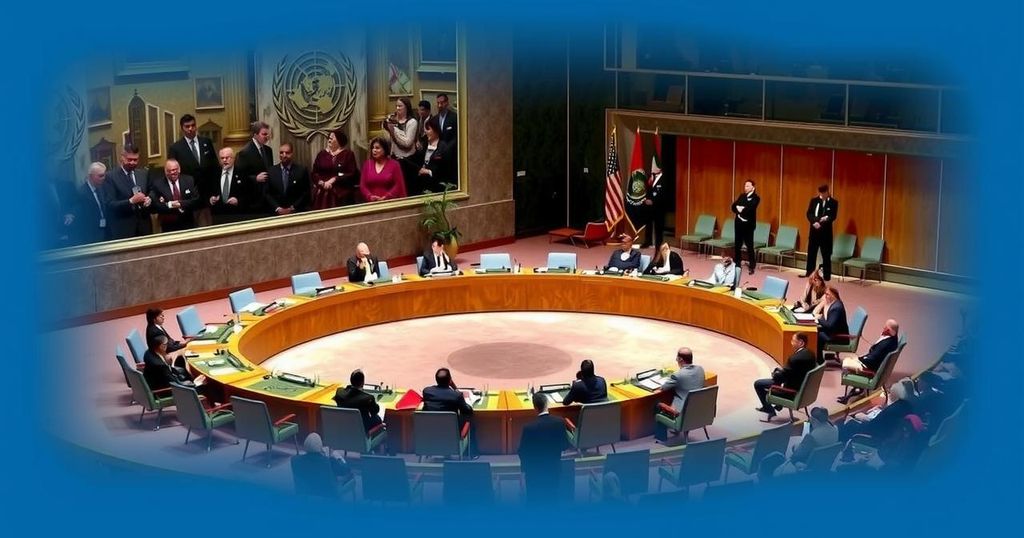On January 1, 2025, Pakistan begins its two-year term as a temporary member of the UNSC, amidst concerns about its history of state-sponsored terrorism. While Pakistani diplomats advocate for a commitment against terrorism, skepticism remains about the country’s true intentions. This membership may empower Pakistan to advance its longstanding agenda concerning Kashmir and impact global security dynamics, highlighting the need for careful monitoring by the international community.
On January 1, 2025, Pakistan commenced a two-year term as a temporary member of the United Nations Security Council (UNSC), marking the country’s eighth tenure on this influential panel. Pakistani diplomats present this as an opportunity for the nation to engage actively in global governance, ostensibly to help address pressing global issues. However, concerns from India and other observers center on Pakistan’s controversial history with state-sponsored terrorism, raising apprehensions regarding its potential to manipulate its UNSC position to further national interests.
Diplomat Munir Akram emphasized Pakistan’s commitment to providing “active and constructive solutions” to global challenges, notably in countering terrorism. While laudable, this declaration appears disingenuous given Pakistan’s ongoing support for various militant groups that operate across borders. Over decades, international criticism has mounted against Pakistan for its role in fostering terrorism, particularly in Kashmir and against India. This historical backdrop casts doubt on Pakistan’s sincerity regarding its UNSC pledges.
As a non-permanent member from January 1, 2025, to December 31, 2026, Pakistan, one of ten temporary members on the UNSC alongside five permanent members, shall participate in significant voting and decision-making processes. Though lacking veto power, Pakistan could sway agendas during critical discussions, particularly in areas where strategic alliances are crucial. Its membership follows Japan’s exit from an Asian seat, implicating Pakistan in a vital position to influence regional and global matters.
India’s concerns persist regarding Pakistan’s UNSC membership. Notably, Pakistan may utilize this platform to advocate for its longstanding agenda related to Kashmir, as it has done in previous international forums. Furthermore, Pakistan’s UNSC role could provide access to pivotal committees, including those specializing in sanctions concerning terrorism. The possibility that Pakistan may obstruct or undermine sanctions against organizations aligned with its strategic objectives remains a significant worry for regional stability.
As Pakistan seeks to solidify its standing in the international community, scrutiny will be paramount. The expectation is that Pakistan must not only verbalize its intentions towards combatting terrorism, but it must also commit to actions that align with global security efforts. The global audience, particularly India, will be vigilant in observing how Pakistan navigates its responsibilities and whether it utilizes this new platform for constructive engagement or self-serving agendas.
This pivotal moment presents Pakistan with a chance to exhibit its dedication to maintaining peace and security on the global stage. Nonetheless, its historical approach raises doubts about its willingness to prioritize genuine cooperative efforts over nationalistic endeavors. Monitoring Pakistan’s conduct on the UN platform will be essential in determining the implications of its UNSC term for both regional and global dynamics.
Pakistan’s temporary membership in the United Nations Security Council commences in January 2025, representing a significant diplomatic opportunity for the country. However, this critical role comes amid scrutiny over Pakistan’s past endorsement of terrorism as a state policy, particularly in relation to its neighbor, India. The background of Pakistan’s historical use of militant groups shapes current perceptions about its eligibility and intent as a temporary UNSC member. The UNSC’s function in global peace and security underscores the importance of Pakistan’s role, which critics fear could lead to an exploitation of its position to further its geopolitical ambitions.
In conclusion, Pakistan’s temporary membership in the UNSC poses both opportunities and challenges for global security dynamics. While the country asserts a commitment to combating terrorism, its historical record necessitates skepticism regarding its true intentions. The international community, especially India, must remain vigilant as Pakistan’s UNSC actions are scrutinized over the next two years. The coming activities will ultimately reveal whether Pakistan can transcend past convictions to embrace a constructive role within a crucial international platform.
Original Source: www.financialexpress.com






